Very few people understand the power of rust like my fellow Toyota truck owners. We’ve been blessed with some of the longest lasting and most reliable vehicles on the planet and yet one wrong move in a northern climate can throw it all away. If these trucks have one Achilles heel, it’s the fact that they’re prone to rust.
Your Toyota truck rusts due to the use of salt on the roads. Doing your best to keep your vehicle clean during the winter months will limit the amount of time the salt has to eat into the metal. Oil spraying will provide protection in cases where you can’t avoid leaving the salt on the surface.
Those of us that have spent our entire lives in Canada or the Northeastern U.S. are lucky enough to have been raised with this knowledge. The majority of us aren’t exactly scientists, so knowing what causes rust and how to avoid it has been passed down to us from generation to generation.
Protecting your vehicle from rust isn’t very complicated once you understand what causes it. Some people believe it’s the snow that causes rust, but that’s not entirely true. Sure, any type of water or condensation can cause rust on bare metal over a long period of time, but that goes for any area during any season. The #1 cause of rust on vehicles is road salt.
Road Salt, and What It Does To Your Vehicle
Road salt is something that cities/counties/provinces/states use to melt snow and ice off the roads during the winter time. It’s basically the government’s way of creating safer driving conditions. It’s certainly effective at that, but it’s also VERY hard on our vehicles.
Road salt is made of sodium chloride, just like the table salt you put on your french fries. It’s also referred to as “Rock Salt” because it has much larger grains (like pebbles) versus finely ground table salt. It’s also mined differently, but we’re here to talk about Toyotas, not underground mining processes.
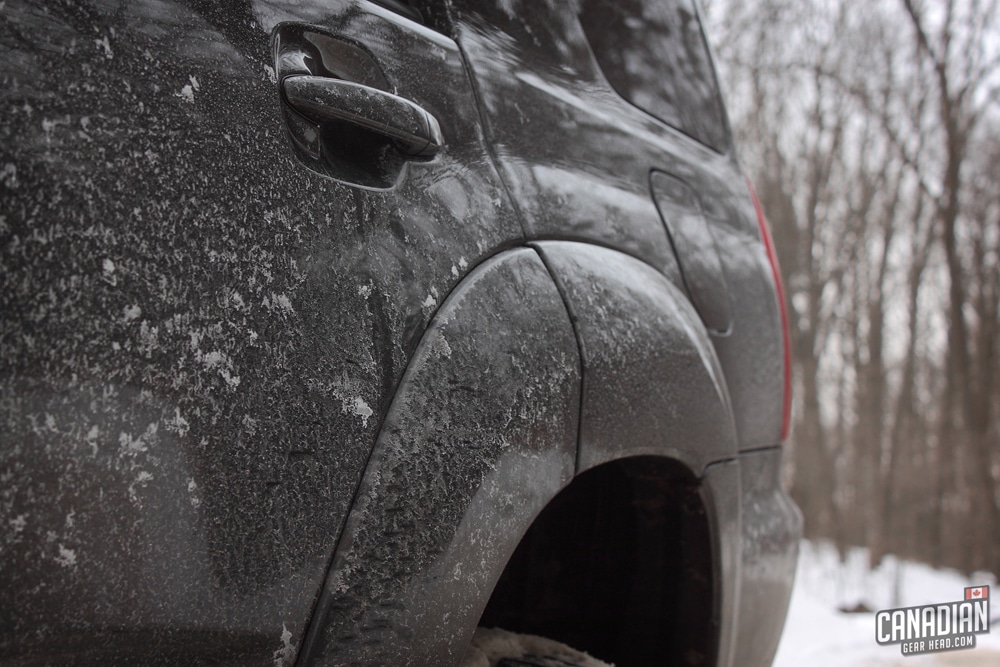
During the winter, the city will dispatch snowplows and salt trucks any time they feel the weather has caused dangerous driving conditions. It might be from a heavy snowfall, freezing rain, or simply wet ground flash freezing due to a quick temperature drop.
They load dump trucks up with a mound of salt and sprinkle it all over the road. Shortly after, the salt melts the snow or ice by turning it into thick slush, then eventually it breaks down to water as traffic chews it up.
I know this is boring, but if you’re new to this climate, you’re going to want to know this stuff. Once you know how and why it’s used, you’ll know how to protect your rig from it. Now let’s get to the part you came here for. Here are some tips to keep your Toyota truck from rusting.
How to Keep Rust From Forming
Luckily, there are a few measures we can take to protect our beloved Toyotas from rust.
Move to Arizona
I’m only partially kidding. Yes, I understand that it would be ridiculous to relocate your entire life just to keep your vehicle in good condition. I’m not suggesting you do that (although it sure is tempting sometimes).
What I’m really getting at, is this: There’s no way to guarantee that your vehicle will remain rust-free if you live in a northern climate. The only way for that to happen is to avoid road salt completely. This is why we store our much-loved cars, trucks, and bikes away for the winter time.
My Toyota MR2 is completely rust free after 27 years in Canada. That’s only because it’s never seen a single winter. Had I driven it year round, I’m sure it would be nothing more than a pile of dust by now.
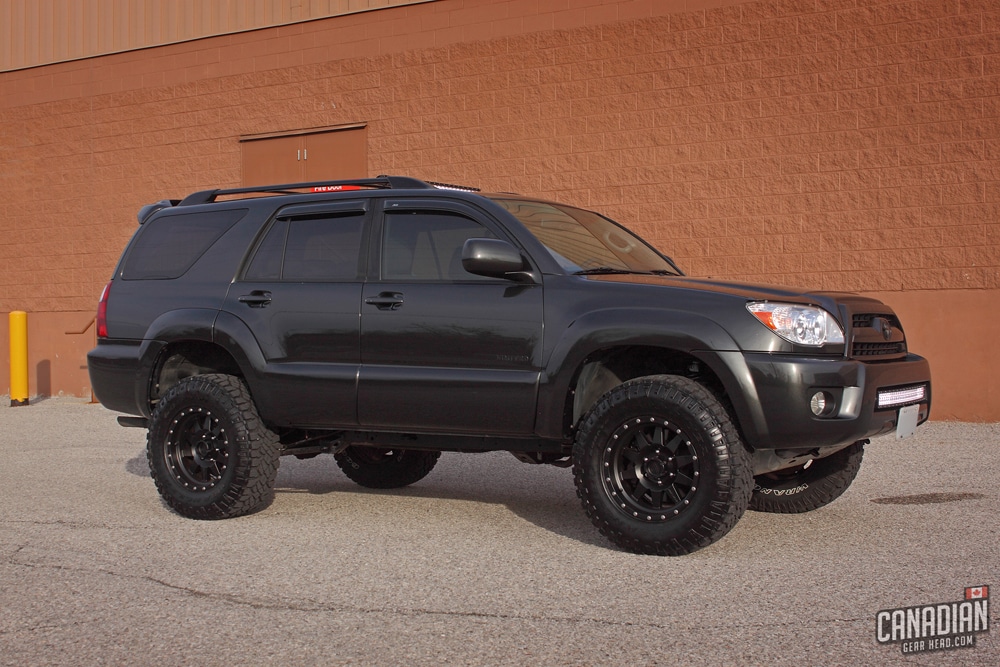
Avoiding road salt is the only way to be 100% sure it won’t damage your vehicle. I’ve seen every rust prevention method known to man, and given enough time, the road salt always wins. It might take a few decades, but it’s usually a losing battle.
Most of us consider a vehicle with only a slightly rusty undercarriage a big win. It’s funny to see people post pics of a truck for sale in groups or forums looking for peoples’ opinions on whether they should buy it or not.
If the undercarriage is covered in orange rust stains but has no holes, northeastern members consider it “clean”. Southwestern members wouldn’t touch it with a 10 foot pole. And if the undercarriage is clean and black, southwestern members consider it normal while those in the northeast think it belongs in a museum!
We can’t completely stop road salt from causing our vehicles to rust. What we can do is manage how badly our vehicle rust with some of these tips below.
Keep It Clean
In my experience, the absolute best way to prevent rust from forming on your Toyota truck is to keep it as clean as possible at all times. Get that salt off as soon as you can. Don’t just wash your paint either.
In general, rust spreads from the bottom up, and from the inside out. It’s absolutely crucial that you rinse your undercarriage, suspension, door jams, and engine bay. These are all common areas for salt to hide that we won’t necessarily see before it’s too late.
If you think that bubble of rust on your fender started on top of the paint, think again. It likely started deep in your wheel well and spread its way outward until you could see a bubble in the paint. When people refer to rust as “cancer”, they aren’t exaggerating. It really does spread that badly.
That’s why getting rust repaired by a body shop is so expensive. They have to cut out and replace a huge piece of contaminated metal in order to fix the small spot that you can see on the exterior. Rust has a mind of its own and loves to spread and grow behind the scenes.
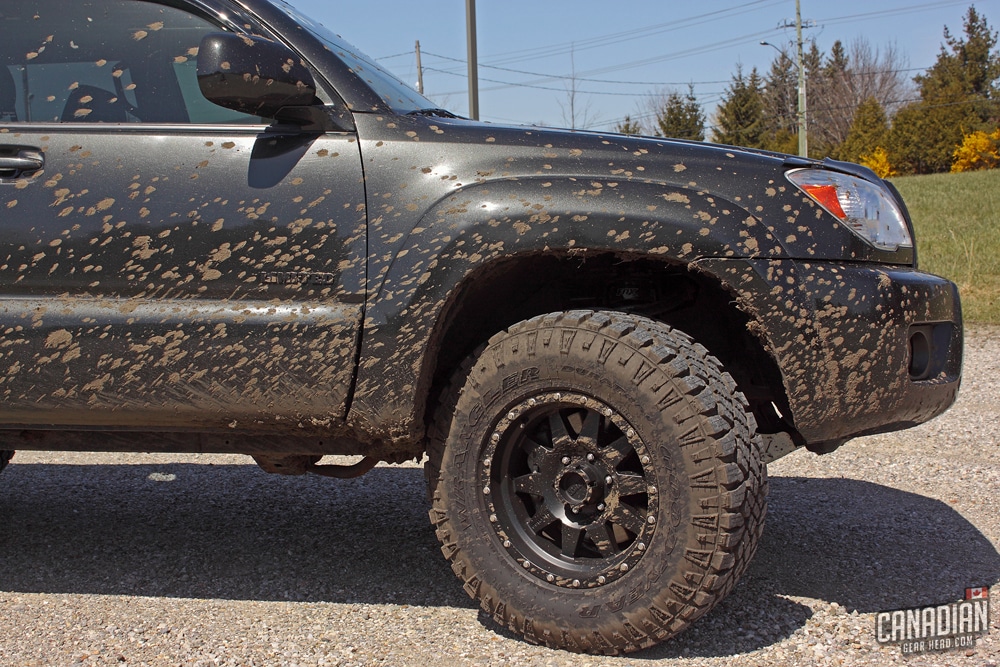
Washing or even rinsing off your Toyota truck after driving in winter conditions is definitely a good practice to get into if you can. As soon as the road salt sits on your vehicle, the clock starts ticking. So the sooner you can get it off, the better your chances are at avoiding rust.
It’s also worth mentioning here that road salt isn’t the only corrosive thing that can cause your undercarriage to rust. Mud can actually cause rust too, even for you southern folks. Depending on where you live, the mud can be acidic or even have traces of salt in it. It also traps in moisture and that can eventually turn to rust too.
So keep your rigs clean, guys. Even if it makes you look like a city slicker. At least your rig will stay in one piece and you won’t need to chop every bolt off whenever you want to replace something underneath.
Get It Oil Sprayed
This is another great way to stack the odds in your favor. Oil spraying is totally common for us Canadians, but it isn’t nearly as well known down south. I’ve actually had a lot of people ask me what I’m talking about whenever I mention oil spraying or rust proofing online.
I watched a video the other day explaining the “best way” to keep your vehicle rust free. He basically summed up what I mentioned above about keeping it clean and rinsing the salt off. I’m not saying I disagree with him because he’s absolutely right.
The thing is, this guy owns a diesel pickup with a 6+” lift. You can practically stand underneath the thing! So of course it’s easy to simply pull into a coin-op car wash and pressure wash your entire suspension and undercarriage.
But what about the people with cars or lower vehicles in general? Good luck rinsing all the salt off underneath without jacking it up first. Heck, the clearance between the fender and tire on most modern cars is barely enough to fit a nozzle in! Unfortunately, we have to come to terms with the fact that we might not be able to get all the salt off every time.
That’s where oil spraying and rust proofing come in. I’m not sure about the USA, but here in Canada, we have businesses that specialize in spraying oil all over your entire undercarriage in the name of rust prevention.
They lift the vehicle up on a hoist and use pressurized sprayers to shoot a thin layer of penetrating oil into every nook and cranny underneath. They also drill holes into your door jams and spray oil inside, as well as spray your strut towers in your engine bay (at minimum).
Want to find out everything there is to know about rust proofing? Check out this article on whether it’s worth the money or not:
These places are great, not only because they’re willing to do this very dirty job for you, but because they know all of the common areas where rust likes to start on specific vehicles – so they can pay extra attention there.
I’ve been taking my winter driven vehicles to a local family owned place called Houghton Rust Control my whole life. Even though I’m a perfectionist when it comes to detailing, I know that I’m not always the greatest at rinsing the salt off after every single storm. These guys have played a huge role in keeping rust away from my vehicles.
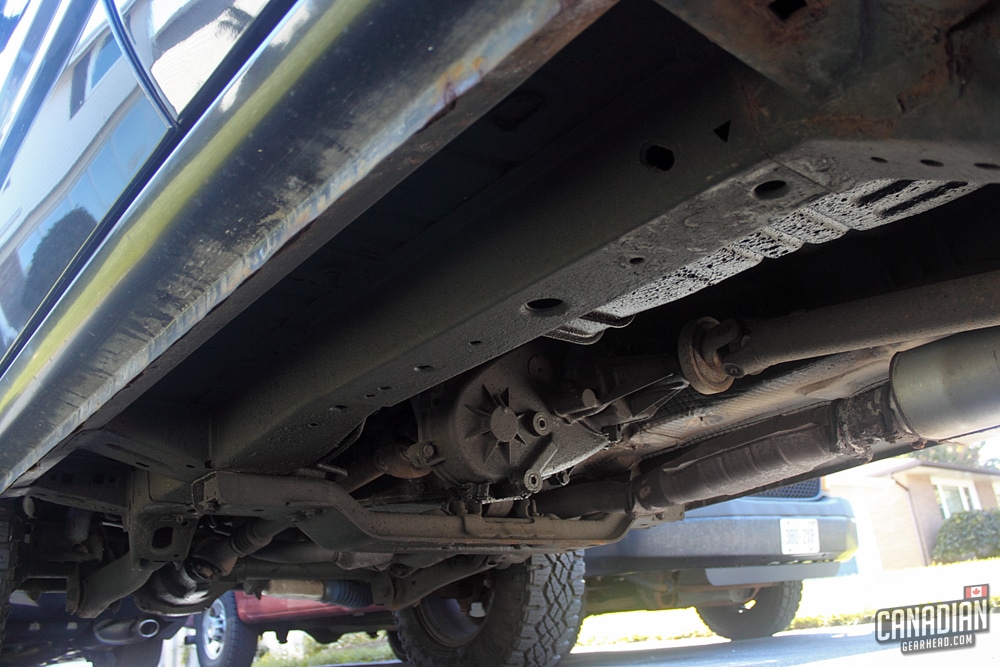
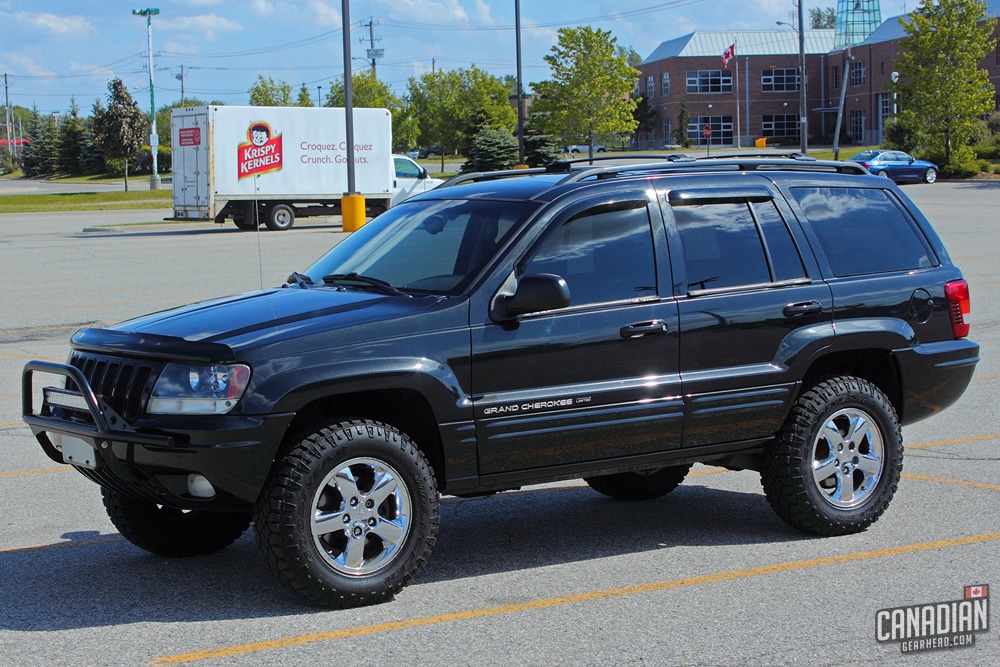
My beloved Jeep that I drove in the winter for 10 years was still in great shape when I sold it. It was one of the few Grand Cherokees for sale in Ontario that still had all of its fenders and floors! That Jeep was a great example of how much oil spraying can do to prevent rust.
The Downsides Of Rustproofing
Oil spraying can be a somewhat invasive process though. As I mentioned, they like to drill holes in your door jams for access (which is always optional, and if they do it, they plug the holes with rubber grommets).
Getting your vehicle oil sprayed is also a very dirty process. As soon as you look into the door of the shop, you’ll see a thick haze of overspray in the air. Even though they don’t directly spray it on your paint, this stuff gets everywhere. It’s bad enough that they’ll even clean your windows afterward for safety reasons.
You’ll need to do a thorough wash after you get your vehicle oil sprayed and because it’s oil, the grime can be a bit difficult to remove. It’s intended to really stick to the surface – which is fantastic on your undercarriage, but not so much on your paint.
You’ll probably have to step up to a heavier duty soap or cleaner, which means saying bye-bye to your wax or sealant. In my opinion, it’s a necessary evil though.
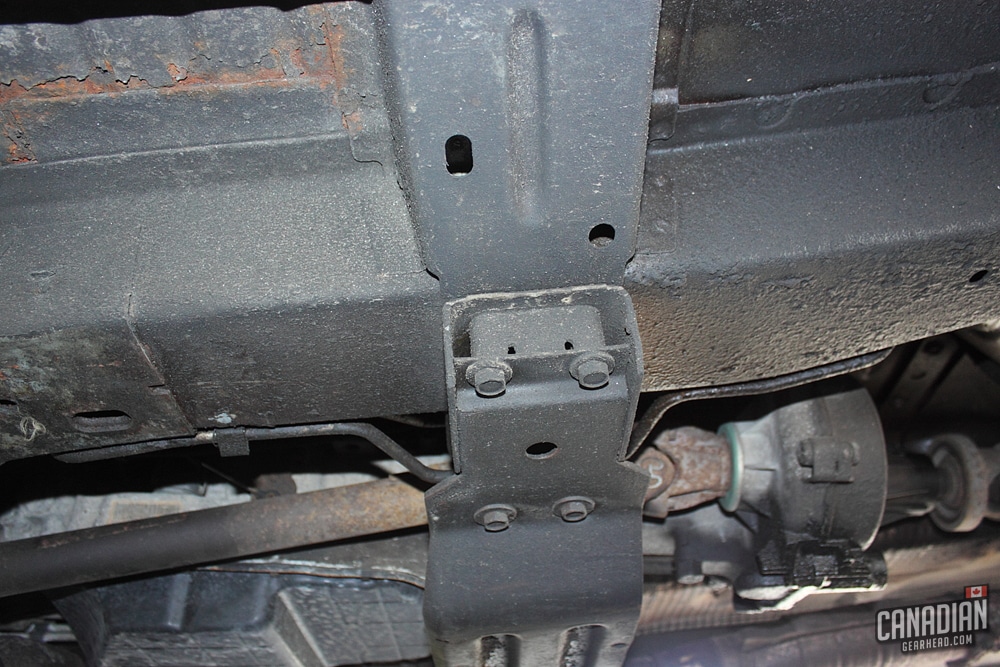
One last downside to oil spraying is the mess it makes when you need to work on something underneath. For example, I waited to have my 4runner oil sprayed until after I had a friend install my Doug Thorley headers.
Doing it the other way would have been cruel and unusual punishment for him. This stuff gets everywhere. So keep that in mind if you’re planning on taking your vehicle to a mechanic any time soon. Do that first and I’m sure your mechanic will be grateful!
Protect Your Paint
You should already be doing this anyways, but protecting your paint during the winter time is another good idea. Paint sealants and ceramic coatings are very helpful in making road salt easier to clean off the exterior of your vehicle. Protecting the top of your vehicle isn’t as important as protecting the bottom, but it’s still important nonetheless.
I recommend applying a fresh layer of paint sealant right before winter starts in order for it to last most of, if not the entire season. Ceramic coatings are more of a set-it-and-forget-it solution so once you’ve applied one you shouldn’t need to worry about it for a couple of years.
Keep Your Carpet Clean
Road salt can be a nightmare to clean out of dark colored carpets. Once it’s trapped in there, it can also cause your floors to rot from the inside out. Leaving road salt anywhere on your vehicle is a bad idea and your carpets are no exception.
Fancy floor mats are definitely helpful, but I’ve also had many times where I’ve been happy to see that a car I’m detailing has Weather Tech mats – only to be let down when I pull them out and find salt stains on the carpet.
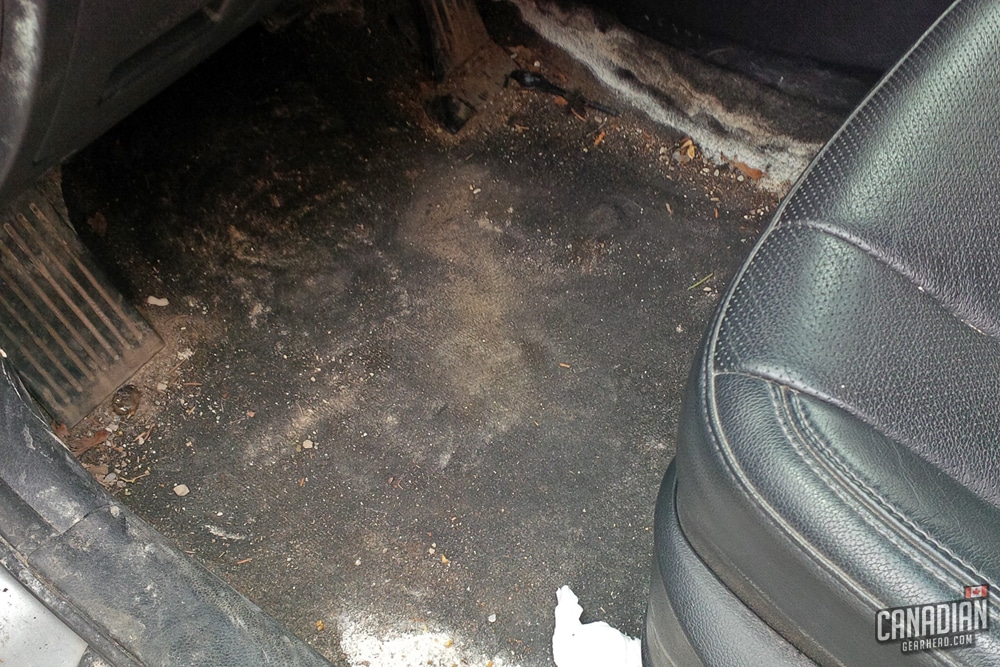
Weather Tech floor mats are much, much better than regular ones. But spending the money on them doesn’t mean that you don’t need to be concerned with what your feet are doing to your floors. They don’t cover everything. Slush covered boots can still wreak havoc on your vehicle’s interior.
Giving your feet a quick kick to shake any snow or slush off before stepping inside will make a huge difference. Avoiding getting your carpet dirty in the first place is always better than cleaning afterward. Remember, salt can actually permanently stain and discolor your carpet if it’s left there for long enough.
So don’t let it build up for years, then expect you can just drop it off at the car wash and have it look brand new again. Steam cleaners and carpet extractors can work wonders, but they can only do so much.
Avoid Salty Situations
I know I’ve already talked about this but I want to touch on a few judgment calls we can make while living and driving in a winter climate. Just because we aren’t avoiding winter entirely doesn’t mean we can’t still avoid some higher risk situations.
If you can, choose when and where you drive wisely. Snowy roads that haven’t been salted yet are actually the best to drive on. Come to think of it, dry, hardpacked, dusty snow is probably one of the best winter road conditions for your vehicle (as long as you’ve got a proper set of snow tires).
The 2nd best scenario is when the roads are simply wet. This is similar to driving in the rain, but there’s going to be a lot of salt mixed in with that water. That means it’s more likely to penetrate into tighter areas of your vehicle.
In my opinion, the worst conditions to drive in is shortly after the salt truck has been out and the snow has turned into a thick, watery slush. Its consistency makes it pack into your vehicle in clumps sort of like playdough. It’ll wedge all of that salty material into your undercarriage and wheel wells and hold it there.
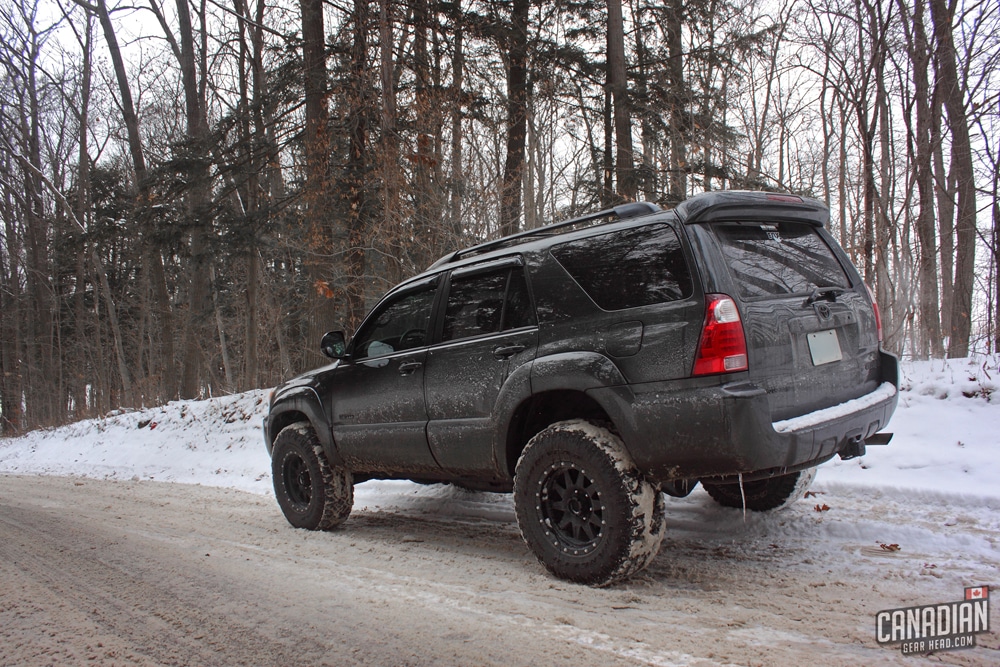
Another thing you have control over is the roads you drive on. In general, higher speed roads like highways, freeways, interstates etc are the first priority for salt trucks. After a storm, these will get hit with salt first because of the high risk of crashes at those speeds.
Chances are the slower speed roads in town or back roads that see less traffic will have either not been salted yet or haven’t had enough vehicles on them to break the snow down to that nasty slush. As long as your vehicle is up to the task of driving on untreated roads, the path less traveled will often be the best route.
I understand that you’ve got to get to work in the morning at a certain time. You might not have any choice but to drive in the worst conditions. But for those other times when you’re thinking about making a trip to the store or going out for dinner, you might want to reconsider when and where you go. Every little bit helps.
There’s one more thing you need to avoid: the salt truck itself. For Pete’s sake, don’t drive directly behind it! I see this all the time, and it’s torture for your vehicle. You’ll obviously get hit with the most salt possible. On top of that, you run the huge risk of stone chips and essentially sandblasting the whole front end of your vehicle. Never, ever follow the salt truck.
Do Electronic Rust Modules Work?
You might have noticed one thing that I haven’t mentioned in these rust prevention tips. Electronic rust modules. That’s because they are complete and utter garbage. They might work in other industries, but they sure don’t work on cars and trucks.
When I purchased my 4runner, the previous owner had installed one of these boxes. Out of the entire engine bay, the only rust that was forming was the 6 inch area surrounding where the module was mounted to the metal. It actually enabled rust to form. The undercarriage also had some rust, the trailer hitch was rusty, and it even had a small rust bubble on the rear hatch. Epic fail.
These modules also give vehicle owners a false sense of security. They think that because of the witchcraft in the box, they don’t need to do anything else to prevent rust. In reality, this is worse than simply keeping your vehicle as clean as possible.
Some Tips For Oil Spraying
1. If you’ve purchased a used vehicle that hasn’t been oil sprayed before, it’s a good idea to thoroughly clean the undercarriage first. You don’t want to trap any contaminants in between the metal and oil.
2. Choose a rust proofing place that uses thin oil. You want this stuff to penetrate as deep into your vehicle as possible. Some places even use oil that starts off thin, then sets up and gets thicker once it reaches its destination.
3. Park on the street for the next 48 hours. Most rust proofing places advertise “no drip” oil, but in my experience you’ll still find a few drops on the ground where you park. Save your driveway if you care about it!
4. Smoking after oil spraying is perfectly normal. If you’ve never had a vehicle oil sprayed before, you might freak out when you see a huge cloud of smoke behind you when you drive away. This is just the oil burning off the exhaust or any other hot spot under your car. It’ll go away within a few minutes.
Until then, you get to enjoy the hilarious looks on other motorists faces when they think your engine is about to blow up.
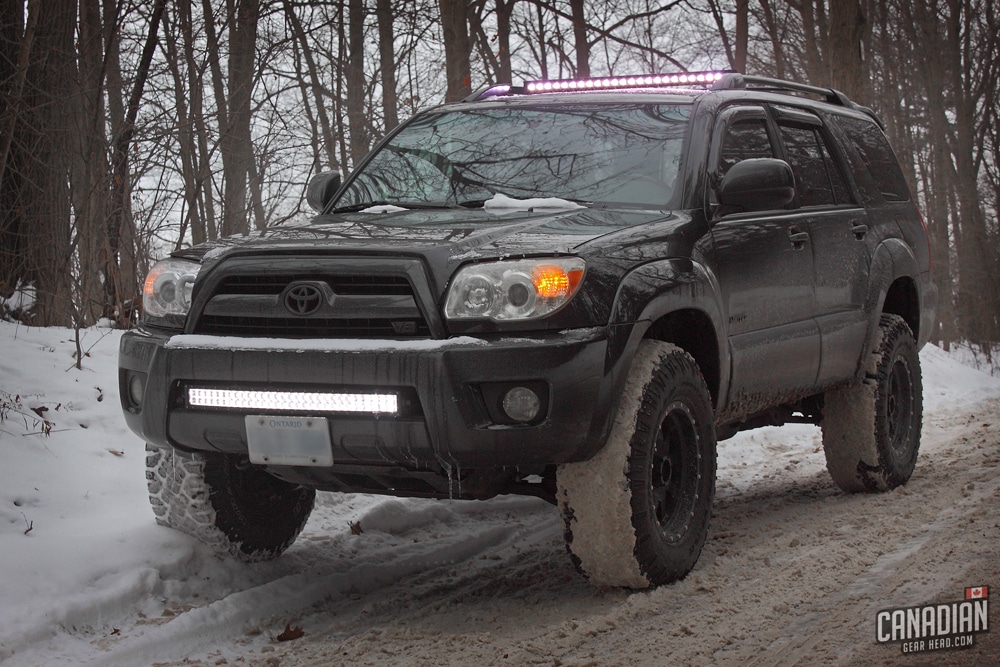
A Few Final Suggestions:
On really cold winter days, the last thing you’ll feel like doing is cleaning your vehicle. Luckily, that’s ok. The colder it gets, the less chance you have of rust forming. Rust likes a warm, wet climate. So when it’s -40C, you don’t need to worry too much about it.
If the forecast shows a mild week coming up though, you’re going to want to get that salt off. Temperatures above freezing are the most critical time to get your vehicle clean.
Exposed metal is always the first to rust. If you have any stone chips that are down to the bare metal, touch them up right away. Otherwise, you’re literally opening the door to rust and corrosion.
Also, keep in mind that rust likes to form in areas that stay wet – so make sure to clean out any tight areas where water pools and snow/slush packs up. Inside wheel wells and rocker panels are important areas to keep an eye on.
Can you rustproof your car yourself? Sure, there are plenty of old-school DIY methods and store bought products you can use. It’s better than nothing. By the time you spend the money on the materials though, you’ll be near or over the cost of paying a specialist to handle it for you.
If you take only one thing away from this article, please just keep your vehicle clean! Salt won’t have a chance to cause damage if you don’t let it stick around for long. They aren’t going to stop putting salt on the roads any time soon, so we have no choice but to keep fighting this battle. Or move to Arizona. I hear it’s nice there this time of year.

Tim is the creator of Canadian Gearhead. His experience with auto detailing and working for Toyota shows through all of the articles posted here. He runs the Canadian Gearhead site and YouTube channel full-time now and currently owns a 2007 4runner, 2006 Tacoma, and 1991 MR2. Read more about Tim:

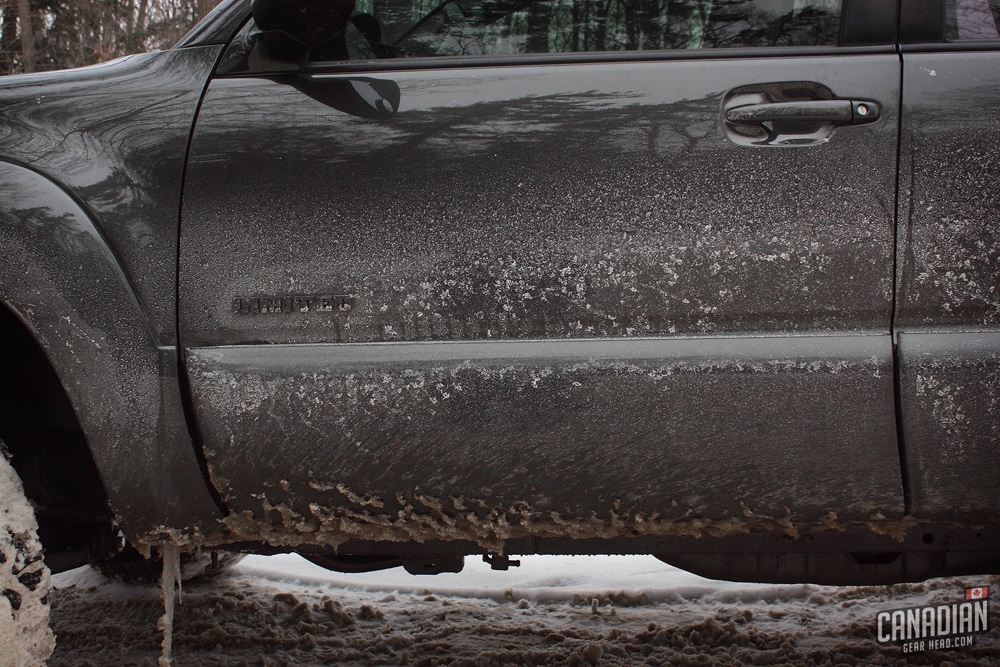

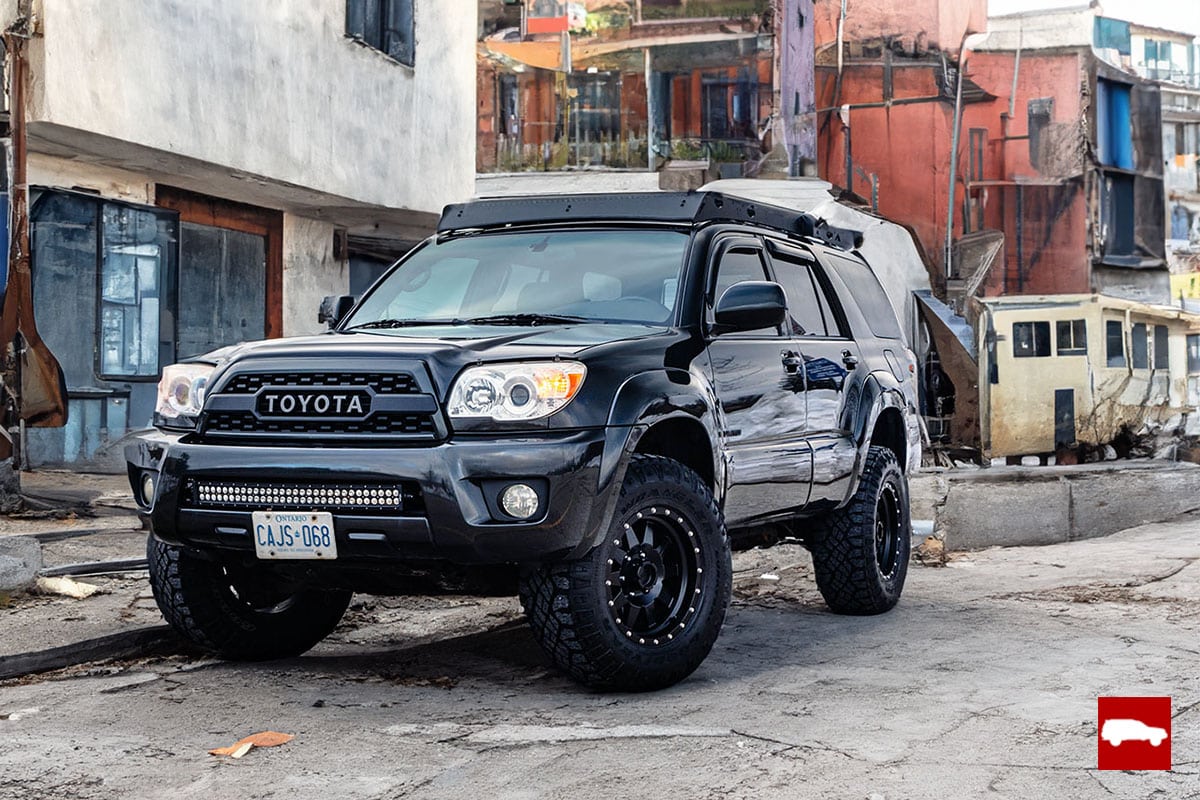
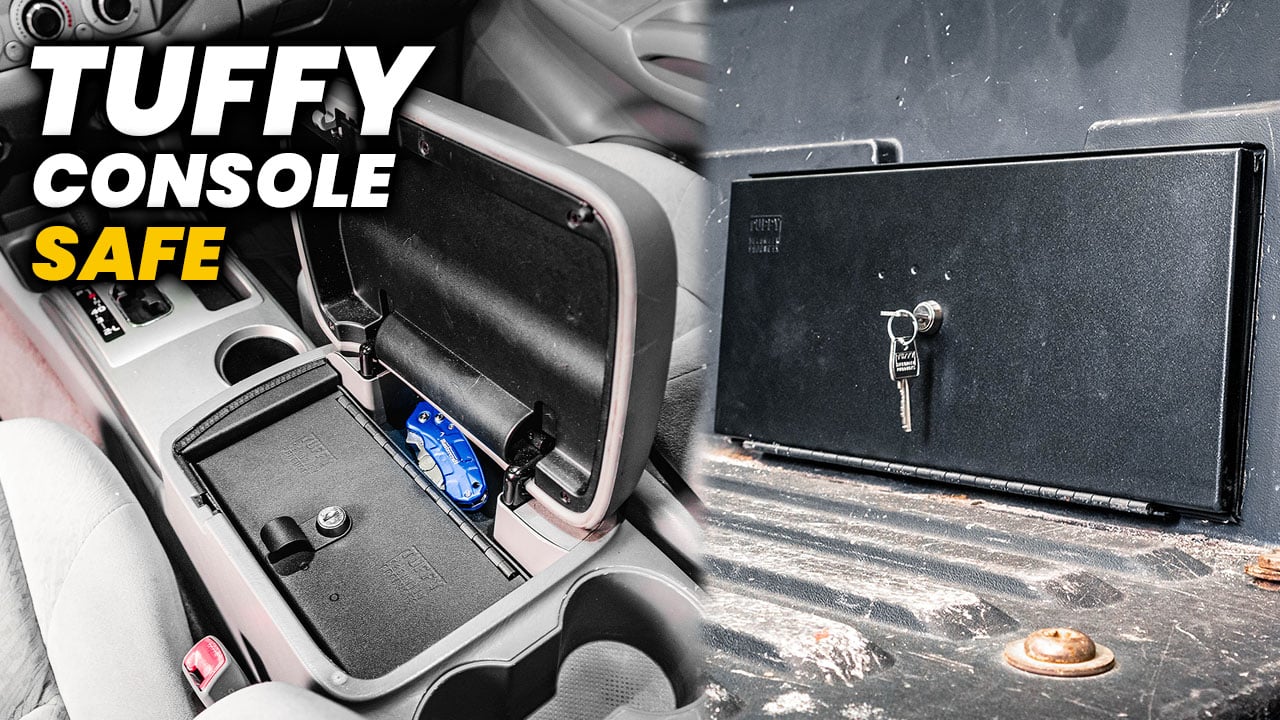
Leave a Reply